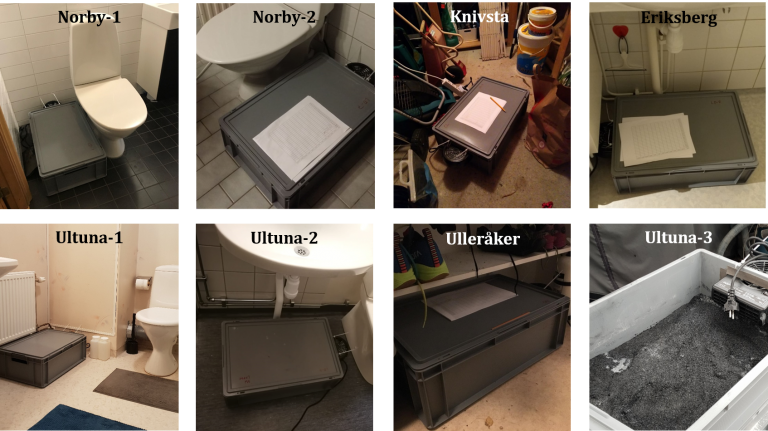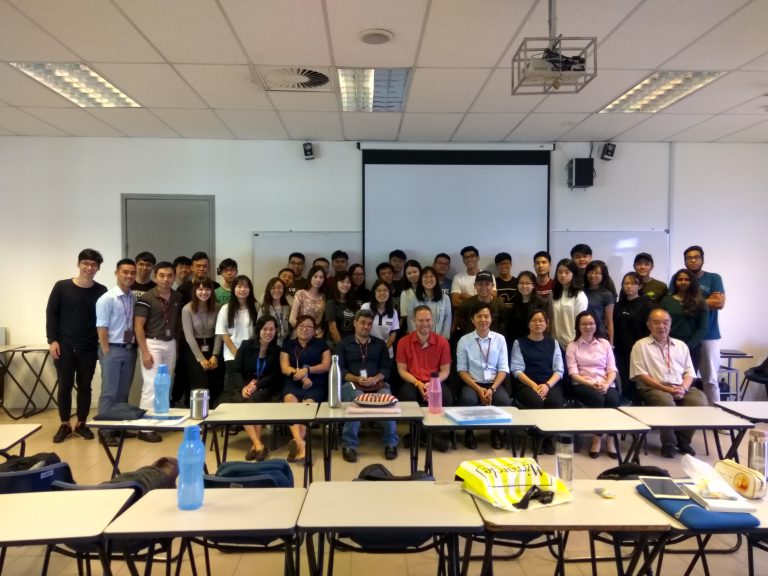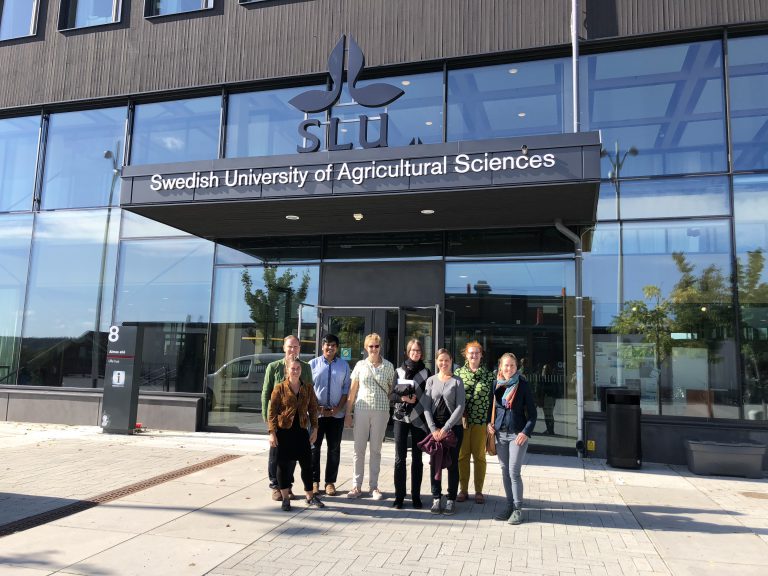 On November 27th, members of the Environmental Engineering group presented results at the MACRO final conference in Stockholm. The project MACRO (Food in Circular Robust Systems) aimed at stimulating innovation for source-separated management of urban organic waste flows within both municipalities and technology suppliers. The project has contributed to filling knowledge gaps regarding both technology and organizational structures. Through MACRO, more opportunities have been created for Swedish actors to develop cutting-edge knowledge in this area, which increases the opportunities for Sweden to positively contribute to the development of the sustainable cities of the future. Our group has contributed with research into the potential for black-soldier fly composting of food waste from kitchen grinders and studies of organizational prerequisites for implementing source-separated system.
On November 27th, members of the Environmental Engineering group presented results at the MACRO final conference in Stockholm. The project MACRO (Food in Circular Robust Systems) aimed at stimulating innovation for source-separated management of urban organic waste flows within both municipalities and technology suppliers. The project has contributed to filling knowledge gaps regarding both technology and organizational structures. Through MACRO, more opportunities have been created for Swedish actors to develop cutting-edge knowledge in this area, which increases the opportunities for Sweden to positively contribute to the development of the sustainable cities of the future. Our group has contributed with research into the potential for black-soldier fly composting of food waste from kitchen grinders and studies of organizational prerequisites for implementing source-separated system. 
Author: Prithvi Simha
New Publication: Health risks from wastewater irrigation in Bolivia
In our latest study published in Journal of Water and Health, we assessed the pathogen flows in a water&nutrients reuse system for production of lettuce in a peri-urban zone in the highlands of Bolivia. Viral and bacterial indicators, and helminth eggs were quantified in soil, water and lettuce samples taken during one crop season, and then statistically processed to analyse the flows of microbial contamination throughout the system.
Piloting urine drying technology at households in Sweden
Over the course of the year, our group has been intensively investigating urine dehydration – to better understand the technology, identify limitations, and pave the way for it to be successfully upscaled. In our latest development on this front, 8 urine dehydrators are being piloted at households across Uppsala, Sweden. Experinece from this pilot installation will surely help us better design, engineer, and implement the technology. The fertiliser end-products from the trials are to be shipped to France, where INRA, the Institut National de la Recherche Agronomique will perform field growth trials using it.
MACRO final seminar on 27 november 2018
The autumn’s most exciting conference on the future sewage system will take place on November 27 in Stockholm! Sign up now for the project MACRO final conference – the participation fee is 500 kr. You will get to know MACRO’s results and conclusions and hear from experts and trusted speakers about: What is the state of knowledge about technology and environmental benefits of sorting of waste and food waste? What experiences are available from the first major projects in Sweden and Europe? What benefits will the sewage system of the future create and how should we handle circular system solutions?
In addition, we and all of our MACRO 20 partners will be in place to tell you about our work. We are looking forward to meeting you in Stockholm on November 27th! Read more at https://vaguiden.se/2018/09/27-november-2018-slutkonferens-for-projektet-macro-mat-i-cirkulara-robusta-system/ ”
Podcastintervju med Björn Vinnerås
Sabina Braun driver Podcasten ”Nu vet vi det!” och har pratat med Björn omkring frågan om vi kan sluta använda vatten. Podcasten kan ni höra här:
Eller som avsnitt 7 av poddcasten “Nu vet vi det!” i din podcast app.
The Krestloppsteknik Newsletter!
Dear Reader,
Hejsan! Thank you for visting our blog and for your (continued) interest in our research group’s activites. The Kretsloppsteknik Blog has been an active newsharing platform at SLU since March 2017. The blog has been an excellent tool for us to communicate with you, helping us disseminate results, updates, and information about our group’s research and educational activities. We now offer the blog in both English as well as Swedish.
Now, we have decided to launch a monthly newsletter. This e-newsletter will serve to summarise all the blogs posted over the previous month and delivered by email. Starting this month, the newsletter is being sent out to our research network.
If you would like to subscribe to this newsletter, please get in touch with us at kretsloppsteknik@slu.se or access this link.
If you do not wish to receive further emails from us, you can always unsubscribe. We will promptly remove you from our email list.
To see previous issues of the newsletter, check out our archive page. We hope you enjoy reading it!
– The Krestloppsteknik Research Group
What larvae need
In our study just published in Journal of Cleaner Production we were interested in finding out what how the larval feedstock affect the efficiency of the black soldier fly larvae (BSFL) composting process in terms of biomass conversion ratio, larval development and larval survival. We compared the process efficiency of nine different feedstocks and two control substrates and compared it to substrate properties, such as protein content and C/N ratio. We found that the substrate properties that had the largest impact on biomass conversion ratio and larval development was the daily larval feeding rate of organic material and proteins, while only the daily feeding rate of organic material impacted the final prepupal size. The feedstock found to be most promising for black soldier fly treatment were abattoir waste, a mixture of abattoir waste and fruit & vegetable waste, food waste and human faeces. The feedstock that did not show great promise (low biomass conversion ratio, long larval development time) were the sewage sludges and fruits & vegetable waste.
We found that the substrate properties that had the largest impact on biomass conversion ratio and larval development was the daily larval feeding rate of organic material and proteins, while only the daily feeding rate of organic material impacted the final prepupal size. The feedstock found to be most promising for black soldier fly treatment were abattoir waste, a mixture of abattoir waste and fruit & vegetable waste, food waste and human faeces. The feedstock that did not show great promise (low biomass conversion ratio, long larval development time) were the sewage sludges and fruits & vegetable waste.
Björn Vinnerås besök på UTAR i Kampar Malaysia
Jag har varit på Universiti Tunku Abdul Rahman som extern examinator vid fakulteten för ingenjörsvetenskap och grön teknik för att utvärdera deras magisterutbildning och doktorandutbildning i ingenjörsvetenskap. Där fick jag chansen att se en god struktur på deras utbildning och läsa om många intressanta projekt som genomförs på fakulteten. Bland deras projekt var det intressant att se Dr. Leong Siew Yoong projekt där hon använder fluglarvskompostering för att behandla avfall, med målet att producera biodiesel från fluglarverna. Under besöket fick jag även chansen att presentera min forskning vid ett seminarium för en grupp miljöteknikstudenter som hade många intressanta frågor. Gruppbild efter föreläsning på UTAR
Gruppbild efter föreläsning på UTAR
Björn Vinnerås visits UTAR in Kampar, Malaysia
Björn Vinnerås was at Universiti Tunku Abdul Rahman (UTAR) as External Examiner at the Faculty of Engineering and Green Technology to evaluate their Master of Engineering Science and PhD education in Engineering. He had the chance of looking at their interesting and good structure of their education and looking through several interesting projects that they are performing. Among all projects, it was interesting to see the Black Sodier fly project where Dr. Leong Siew Yoong was looking into the potential of using the lipids from the larvae to produce biodiesel. During the visit, Björn also gave a guest lecture for the Environmental Engineering students, with many interesting questions and discussions. Group picture after the lecture at UTAR
Group picture after the lecture at UTAR
Finnish delegation visits SLU to discuss on-site urine treatment
Last week our group hosted a delegation of stakeholders from Finland, representing between them the City of Tampere, The Finnish Environment Institute, The Global Dry Toilet Association of Finland and Tampere University of Applied Sciences. They were at SLU to discuss their ongoing projects, MORTTI – mobile nutrient recovery under field conditions and HIERAKKA – long-term effects of applying urine fertilizers. The project looks at identifying and piloting new solutions for the capture and utilisation of nutrients in urine and faeces. We thus discsussed the possibilities for on-site treatment of urine in Finland as well as potential collaboration for implementing urine drying technology at pilot study locations. This was followed by visits to our lab, where we have been running three household-scale urine drying systems & a tour of our black soldier fly composting colony.  PC: Carl Willandt, Ekokumppanit Oy
PC: Carl Willandt, Ekokumppanit Oy
